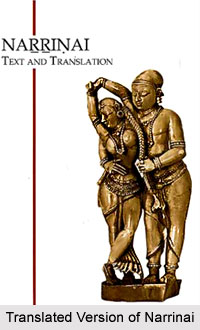 Narrinai, also known as Natrinai, is a classical poetic work and comprises one of the books of the Ettuttokai or Ethuthokkai anthology in Tamil literature from the Sangam age. Narrinai comprises of four hundred verses that deal with the 5 different landscapes found in the poetry of Sangam literature, namely Kurinchi, Marutham, Mullai, Paalai and Neithal. This belongs to a number of the earliest available Tamil literature and can be traced back to the period between 100 BCE - 200 CE, in the Sangam age. The stanzas in the poetic work of Narrinai are of different lengths that range from 9 to 12 lines each. Maaran Vazhuthi, a Pandya king patronized this compilation of Tamil verses. It is difficult to ascertain who compiled the collection of poems in Narrinai or Natrinai, and even at the present age the name of the compiler of the work remains anonymous.
Narrinai, also known as Natrinai, is a classical poetic work and comprises one of the books of the Ettuttokai or Ethuthokkai anthology in Tamil literature from the Sangam age. Narrinai comprises of four hundred verses that deal with the 5 different landscapes found in the poetry of Sangam literature, namely Kurinchi, Marutham, Mullai, Paalai and Neithal. This belongs to a number of the earliest available Tamil literature and can be traced back to the period between 100 BCE - 200 CE, in the Sangam age. The stanzas in the poetic work of Narrinai are of different lengths that range from 9 to 12 lines each. Maaran Vazhuthi, a Pandya king patronized this compilation of Tamil verses. It is difficult to ascertain who compiled the collection of poems in Narrinai or Natrinai, and even at the present age the name of the compiler of the work remains anonymous.
It is considered that various authors, such as Perunthvanaar and Alankudi Vanganaar have composed these poems in Narrinai. Perunthvanaar also who translated Mahabharatham into Tamil language. The names and identities of the authors of 56 poems are not known and are still unrecognized, although the 192 authors of the poetic work have been identified and their names are known as well. The 234th poem in the Tamil literary work of Narrinai has been misplaced and is considered to be damaged and unavailable. Further more, a part of the 385th verse is also not there in the work and cannot be located in any of the available manuscript copies. The original manuscript of the work did not categorise the verses and poems in the Narrinai or Natrinai anthology into the different landscapes known as Thinai in the Tamil language. They were initiated and incorporated later during the nineteenth century when the book of Narrinai anthology was first printed and published.
The Narrinai collection of Tamil poems contains numerous verses composed by various poets. A fascinating poem from Narrinai narrates that the central character or hero of the literary work named Talaivan escapes with his lover Talaivi, who is the heroine of the work. Even though Talaivi is discontented and sad about leaving her family and paternal house but on the insistence of her lover Talaivan, she decides to elope with him and live together happily. The hero Talaivan mentions to him that if anyone attempts to come between him and his love and clash with him for the cause that he has escaped with Talaivi, Talaivan would make his stand and fight with the offenders and chase them away. Talaivan also mentions that he would rather prefer to hide in peace than to fight with the relatives of his lover Talaivi, as they have now become his own relatives. The couple considers the elopement as equal to a conventional marriage, thus he believes it is a sin to disagree and fight with his own relatives.













